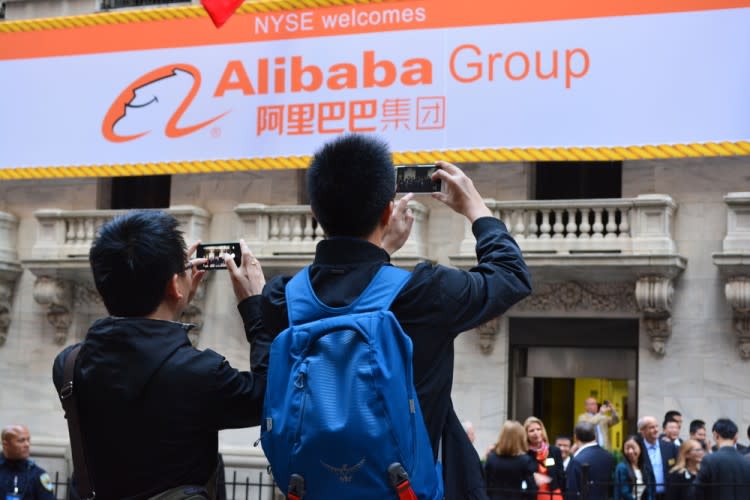[ad_1]
“A position we built towards the end of the year and added to three of our funds during the quarter is Alibaba, the Chinese internet giant. Our upside opportunities for these stocks are related in part to the increased regulatory scrutiny of the internet sector by the Chinese government, which we continue to monitor.
Alibaba is the largest e-commerce company in China with a market share of over 50% of the gross goods value. We first bought Alibaba for the funds towards the end of the calendar year. The core businesses of the consumer marketplaces include Taobao (China’s largest online shopping destination for consumers) and Tmall (China’s largest third-party platform for brands and retailers). In addition, Alibaba operates the dominant cloud platform in China (AliCloud), international e-commerce activities (Lazada, etc.) and digital media services, and has several strategic investments including a 33 percent stake in Ant Financial.
Alibaba’s share price weakened significantly in the fourth quarter of 2020 due to increased regulatory scrutiny, including a postponed Ant Group initial public offering originally slated for the November 2020 law that extended the law to include internet platforms and practices such as platform exclusivity, predatory pricing, and price discrimination, among others prohibits based on user data. SAMR also opened an official antitrust investigation against Alibaba and the Ant Group in December. At the time of purchase, we thought that the SAMR investigation of Alibaba’s core e-commerce business would have rather limited impact as many merchants already operate on multiple platforms, but Alibaba’s strong ecosystem, traffic and marketing efficiency makes it different feel attracted. There are network effects associated with a very large user and dealer base. The large Alibaba ecosystem (including local services, payments, etc.) also enables data integration across different scenarios to provide more targeted solutions for merchants and customers. Alibaba’s core business is a strong cash generator. We believe it should keep growing with the e-commerce sector, fueled by growing consumption in China and penetration into newer categories.
Alibaba has continued to invest heavily in newer initiatives such as Taobao Deals and Taobao Grocery to extend the company’s growth trajectory.
In April 2021, SAMR announced a $ 2.75 billion fine, equivalent to 4% of sales and a small fraction of Alibaba’s net cash ($ 51 billion as of December 31, 2020). Management does not anticipate any material impact on its business from the regulatory changes to the exclusivity agreement. Ant Financial could face greater regulatory impact, but it is a relatively small fraction of our overall valuation of Alibaba, so we believe the downside is limited. At the time of purchase, Alibaba was selling less than 12x its estimated core “marketplace” EBITA after subtracting the values ​​for its other assets (i.e. international trade, cloud and new media) from the company value. We rated the company’s cloud business with an operating margin similar to that of Amazon Web Services (AWS) and a 15x operating multiple. While the cloud business was only marginally profitable in the last quarter, Alibaba is a significant leader in the industry (≈40% market share) and has first-mover advantages. As can be seen from AWS, the cloud is an industry with strong economies of scale and high switching costs. China’s cloud industry is less mature than the US, and Alibaba has invested heavily to grow its size (AliCloud increased sales by over 50% in 2020), and in the longer term, we are optimistic that its operating margin will exceed the AWS- Level can reach. Alibaba’s management recently issued a financial forecast that said all of the company’s incremental operating income will be reinvested in new initiatives this year (fiscal 2022). As a result, the company’s operating profit will remain relatively stable this year. We don’t think this will change the long-term earnings growth rate or the value of the company.
In addition to Alibaba, our funds have stakes in several other Chinese companies, including Dali Foods, a snack food company; A-Living, a property management company; Baidu, sometimes referred to as the Chinese Google; Shanghai Mechanical and Electrical, which markets and manufactures elevators; and several Hong Kong based companies. All of these additional investments, including Alibaba, account for approximately 8% of the International Value Fund’s total assets. Primarily, all of these investments were made at prices well below our estimates of intrinsic value, and we believe the underlying businesses have the potential for higher return profiles than many of our other investments. Second, economic growth rates in China and other parts of the Far East significantly exceed those of most western economies. China is currently the second largest economy in the world and could become the largest in the not too distant future. Third, while the Chinese government has recently stepped up its regulatory oversight of a number of industries, in part to meet broad social goals, we do not believe these measures will ultimately affect the effectiveness and value of the investments we make. We will continue to manage our risk by exercising extreme price sensitivity on purchases, diversifying our exposure, focusing on companies that are not in the Chinese government’s “crosshairsâ€, and by limiting our overall portfolio allocation to no more than 10% of the total entire portfolio assets at cost. As an aside, we were also encouraged to see that the Daily Journal, a company chaired by Charlie Munger, recently established a prominent position at Alibaba. “
[ad_2]

